You are using an out of date browser. It may not display this or other websites correctly.
You should upgrade or use an alternative browser.
You should upgrade or use an alternative browser.
A Glorious Union or America: the New Sparta
- Thread starter TheKnightIrish
- Start date
Threadmarks
View all 207 threadmarks
Reader mode
Reader mode
Recent threadmarks
Chapter One Hundred and Fifty Nine The Long Road Home Chapter One Hundred and Sixty A New Beginning Part I Chapter One Hundred and Sixty One A New Beginning Part II Chapter One Hundred and Sixty Two A New Beginning Part III Chapter One Hundred and Sixty Three The Emperor is Enthroned Chapter One Hundred and Sixty Four The Emperor's Coat-tails Part One Chapter One Hundred and Sixty Five The Emperor's Coat-tails Part Two Chapter One Hundred and Sixty Six The Consuls of His EmpireAs has often been reflected on, the leaders of the Confederate Army are gentlemen ... so such a base attack on a woman would offend their sensibilities greatly. Such a reaction is understandable ...
The leaders of the Confederacy thought of themselves at gentleman. On the other hand, many southern leaders considered the following to be a southern gentleman defending his honor.

Last edited:
Good to see this back. It seems like there's a developing fault line between the die-hard Confederates and the officers who believe that it's time to make peace and that political assassination is a step too far. I'm guessing that the former will be the ones who go to the gallows, while the more conciliatory ones will be able to pursue careers elsewhere (such as Cleburne in Mexico and the Ottoman Empire - I really hope we see the career of Cleburne Pasha at some point).
Good to see this back. It seems like there's a developing fault line between the die-hard Confederates and the officers who believe that it's time to make peace and that political assassination is a step too far. I'm guessing that the former will be the ones who go to the gallows, while the more conciliatory ones will be able to pursue careers elsewhere (such as Cleburne in Mexico and the Ottoman Empire - I really hope we see the career of Cleburne Pasha at some point).
I seem to recall discussion of a post war split and it having an impact on Gideon Pillow.
I seem to recall discussion of a post war split and it having an impact on Gideon Pillow.
From Post 901: "In the post-war environment, following his escape to Mexico, Pillow would become a polarizing figure for Confederate community there - between the Army-based integrationalist faction and the “exilado gris” faction led by former states-rights politicians…"
Starting new job in West London on 11th November. Hopefully I will have somewhere to live and the internet before then so I can get some updates in!
Goodbye forever to BIRMINGHAM (Thats in England not Alabama you ruddy colonials!).
Hello MIDDLESEX (Thats a county in England not Virginia or New Jersey or Massachusetts or Connecticut - don't start that again!).
Goodbye forever to BIRMINGHAM (Thats in England not Alabama you ruddy colonials!).
Hello MIDDLESEX (Thats a county in England not Virginia or New Jersey or Massachusetts or Connecticut - don't start that again!).
I think it is obviously that you are a transplanted Yank!Starting new job in West London on 11th November. Hopefully I will have somewhere to live and the internet before then so I can get some updates in!
Goodbye forever to BIRMINGHAM (Thats in England not Alabama you ruddy colonials!).
Hello MIDDLESEX (Thats a county in England not Virginia or New Jersey or Massachusetts or Connecticut - don't start that again!).
I think it is obviously that you are a transplanted Yank!
I am from the birth place of James McHenry (3rd Secretary of War of the United States) and the parents of the 21st President Chester A. Arthur. Extremely distant relatives of mine settled Maine (or whatever it was called in 1620), Pennsylvania and Virginia (1750s) and New York (1790s) and at least one relative emigrated to, fought for, and then emigrated back from the Confederacy...all of the above still makes me Irish!
When I was referring to economic issues, I had in mind monetary policy, especially regarding "greenbacks". Also in response to Corder, the economy was not as robust as you might think.
Here's a few articles I found on a "Gold Standard" website which has a history of money and economic policy during and after the war IOTL: What I wonder is what kind of policies will a surviving Lincoln and his successors follow in regards to greenbacks and the money supply?
Also will we see a "Free Silver" movement or its equivalent ITTL?
I've read around and Milton Friedman refuted the arguments against bimetallism. Maybe the US could go back to a gold and silver monetary system.
I'd be interested to see that refutation (what book? or is it excerpted online?), although I generally have a poor opinion of Friedman.
When convertibility was suspended in 1861, the US, like most developed nations, was on a bimetallic standard. Only Britain idiosyncratically maintained that only gold was money at that time. However, by 1876 (when restoring currency convertibility was on the table), the large majority of developed nations had come around to Britain's point of view. Only France still stubbornly maintained bimetallism, and France was taking a beating in the currency and bond markets for its obstinacy. A return to bimetallism in 1876 means a dumping of European silver on the American market, leading to massive inflation (with resulting permanent currency imbalance and Europeans snapping up American stocks at bargain prices while Americans cannot afford to buy them), the US having to compensate European banks with western lands, or all of the above. Restoring bimetallism is the end of America's economic sovereignty, and thanks to the example of France, every banker and economist in America knows it. The wave of western bank failures resulting from the gold standard was anticipated and judged an acceptable price for continued autonomy.
When convertibility was suspended in 1861, the US, like most developed nations, was on a bimetallic standard. Only Britain idiosyncratically maintained that only gold was money at that time. However, by 1876 (when restoring currency convertibility was on the table), the large majority of developed nations had come around to Britain's point of view. Only France still stubbornly maintained bimetallism, and France was taking a beating in the currency and bond markets for its obstinacy. A return to bimetallism in 1876 means a dumping of European silver on the American market, leading to massive inflation (with resulting permanent currency imbalance and Europeans snapping up American stocks at bargain prices while Americans cannot afford to buy them), the US having to compensate European banks with western lands, or all of the above. Restoring bimetallism is the end of America's economic sovereignty, and thanks to the example of France, every banker and economist in America knows it. The wave of western bank failures resulting from the gold standard was anticipated and judged an acceptable price for continued autonomy.
I think you meant to link to the first item on that list - a PDF.
Economic AH is not for the faint of heart!
Starting new job in West London on 11th November. Hopefully I will have somewhere to live and the internet before then so I can get some updates in!
Yes yes yes! Good luck on getting a new job by the way.
Goodbye forever to BIRMINGHAM (Thats in England not Alabama you ruddy colonials!).
TBH I was always quite puzzled by your signature. When I think of Birmingham I automatically think about England. I think that Birmingham in Alabama is not as famous.
Hello MIDDLESEX (Thats a county in England not Virginia or New Jersey or Massachusetts or Connecticut - don't start that again!).
When someone says Middlesex I automatically think about literal Middle Sex - somewhere between male and a female.
Chapter One Hundred and Thirty The Cusp of Victory
Chapter One Hundred and Thirty
The Cusp of Victory
From “Kearny the Magnificent” by Roger Galton
NorthWestern
"As 1864 opened it was clear that only a handful of states intended to permit soldiers in the field to vote. The following states either already allowed soldiers to cast ballots or intended to pass legislation to permit it: California, Kansas, Kentucky, Maine, Michigan, Rhode Island, and Wisconsin...
General Kearny was not alone in concerning himself with the soldiers' vote. However unlike Republican and Democratic politicians Kearny expressed no views about how the army would or should vote. Indeed to all appearances he did not care how soldiers might vote, simply that they should have the right to vote...
Again General Kearny, with the assistance of General Oliver O. Howard, embarked on a campaign to broaden the list of states which would offer serving soldiers the right to vote. Kearny spoke to newspapermen and to the journals; he wrote to Governors and Congressmen of all parties; he used all the influence at his disposal among the politician-generals of the Union army...
Kearny was particularly scathing about the proposals that at 'election time' military campaigning would be halted and furloughs granted to soldiers to return to their states to vote. "I cannot conceive of a measure more prejudicial to conduct of the war...it seems lost on them [those proposing the furloughs] that elections occur throughout the year in the various states...what advantages we would therefore give the rebels" (Kearny to Stanton)...
Through constant lobbying throughout the year several other states made the necessary arrangements to permit voting in the field: Illinois, Iowa, Massachusetts, New Jersey, New Hampshire and West Virginia. To those other governors and legislatures that refused to head the call for 'soldiers' rights and soldiers' votes' Kearny gave a stark warning "Tens of thousands of men, now in uniform, have been denied their rights to vote despite donning the uniform of their country to protect their homes and those of their neighbours; despite risking their lives daily in the cause of national unity and the preservation of our Republic. Do those politicians, those draft dodgers and speculators, comfortably situated before their own hearths, who have not heeded their will, do they think that these men, these soldiers will ever forget this theft..." (comment to assembled reporters in camp in North Carolina)..."

From "The Spirit of Victory - The Elections of 1864" by Fergus Glubb
Northwestern 2001
"When we talk of the elections of 1864 many assume we refer to one day's voting in November 1864; that the Presidential, congressional and gubernational elections for 1864 were decided in one day. That of course is wholly incorrect...
The Presidential Election of 1864
The 1864 election was the first time since 1812 that a presidential election took place during a war...
As 1864 progressed it seemed increasingly likely that Lincoln would be re-elected. Union forces had triumphed repeatedly in North Carolina and advanced relentlessly on Atlanta and then the fall of Charleston! These victories had taken the wind out of the radical wing of the Republican party and prevented a third party candidate...
During the tumultuous month of August as the divided Democrats struggled to unite behind a candidate two great hammer blows fell on Democratic hopes: the surrender of the two main rebel field armies in North Carolina and Georgia. As these political and military events made Lincoln's re-election seem inevitable, Democrats struggled to get Seymour's campaign going, the candidate himself seemingly more interested in running for re-election as New York's Governor...
In the first place, the Democrats had to confront the severe internal strains within their party at the Democratic National Convention. The political compromises made at the Democratic National Convention were contradictory and condemned Seymour's campaign to be inconsistent and difficult...
Seymour's supporters looked to win in states like Delaware, Maryland, Kentucky, New Jersey and New York but with no realistic strategy or expectation of a victory in the Electoral College. Any chance of victory Horatio Seymour may have had died with Mrs. Lincoln...
With the death of Mrs. Lincoln moving the whole nation to anger against the South and sympathy for their President, and with no question that a Union military victory was inevitable and close at hand, the die was cast against the Democrats...
Kentucky stood alone in the Democratic cause much to the embarrassment of many Kentuckians
In the end, the National Union Party mobilized the full strength of both the Republicans and the War Democrats under the its slogans "Lincoln and Unity" and, more chillingly in some regions, "Revenge!". It was energized as Lincoln made emancipation and National Unity the central issues, and state Republican parties stressed the perfidy and treachery of the Copperheads...
Only 25 states participated in the election, since 11 Southern states had declared secession from the Union and formed the Confederacy. Three new states participated for the first time: Kansas, West Virginia, and Nevada. Horatio Seymour won just one state: Kentucky...
Lincoln was highly popular with soldiers and they in turn recommended him to their folks back home. The army vote was critical in several states, not least in New Jersey, General Kearny's adopted state, where they clearly carried the state for Lincoln. In no state, not even Kentucky did the army give a majority of votes to Seymour...
The Governors of 1864
"The tide of the war was no clearer than in the gubernational elections of 1864. Not a single Democrat was returned as governor during that year...
The year began with the election of Colonel William M. Stone as governor of Iowa. Colonel Stone had included votes for Iowan soldiers in the Fall Elections as a central plank of his campaign, at the insistence of several senior Western Generals...
General John M. Palmer narrowly defeated General Richard J. Oglesby for the Republican nomination for Governor of Illinois and went on to a "thumping victory" over his Democratic opponent. Oliver P. Morton was returned to the Governor's Mansion in Indiana. Connecticut elected William Buckingham while Nevada chose Henry G. Blasdel...
In the antagonistic twins of the west, Kansas and Missouri, Kansas elected Colonel Samuel J. Crawford (not to be confused with the Eastern Major-General Samuel Crawford) and Missouri returned Thomas C. Fletcher. Fletcher expressly identified himself as a "National Unionist" rather than a Republican and he was not the only candidate to do so where the word Republican was still a stigma...
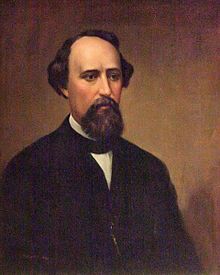
Governor Thomas C. Fletcher of Missouri
Governor Austin Blair was re-elected as Governor of Michigan on the National Union ticket. Blair has considered relinquishing the office but his close friend Philip Kearny is supposed to have disuaded him from the rash decision. Finally, and most importantly for the fortunes of the Republican-National Union party another friend of General Kearny was to achieve high office, at his second attempt: James S. Wadsworth. Wadsworth, who had lost the contest for the governorship of New York to Horatio Seymour in 1862, had turned the table on Seymour at the second attempt. Wadsworth, who had learned from his first campaign, had taken a more active role in managing his campaign and had attacked Seymour for his lack of commitment - "Does he mean to be President or Governor? New York should never be any man's second choice!" (Wadsworth in a widely publicised letter to Colonel John H. Ketchum)...
It has been suggested that, despite protestations against the proposal, General Kearny had arranged for several New York regiments to be granted leave in time to vote..."
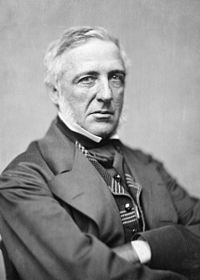
General James S. Wadsworth would turn Horatio Seymour out of office in New York
The Senate
"Many today forget that in 1864 Senators were not elected by popular vote. They were in fact (and to the disgust of at least one contemporary politician) chosen by their State Legislatures. In 1864 it was the turn of the Class Two Senators to be chosen...
Delaware's Democrats were rocked by the assassination of Mary Todd Lincoln. In the days following several rumors circulated about links between the Baltimore Spy Ring and figures in Delaware. As a result the loyalty of many Delawareans was questioned. A section of the State Legislature sought to take advantage of this and opposed the return of Willard Saulsbury Sr to the Senate. Saulsbury was a vehement critic of President Lincoln and furthermore his behaviour on the Senate floor in 1863 had been considered by some as despicable (Seward). On one occasion he was alleged to have been intoxicated and armed, and was only prevented from entering onto the Senate floor by another Democratic Senator (according to Congressman Schuyler Colfax). These War Democrats pushed for the more acceptable (to the administration at least) Henry du Pont, Adjutant General of Delaware, for the post. After several stormy sessions Du Pont was confirmed as Delaware's Junior Senator as an Unconditional National Unionist...
Kentucky too would have a hotly contested nomination. The military commander in Kentucky, William "Bull" Nelson, was not pleased that he seemed likely to fail to swing the state to President Lincoln (despite several questionable election practices that were later the subject of legal proceedings). However Nelson resolved to use all his political capitol and influence to keep Kentucky's available senate seat out of the Democrats' clutches. The Democrats were pushing old hand James Guthrie who had been Secretary of the treasury under President Franklin Pierce...
Bull Nelson however had an ace up his sleeve: Lovell Rousseau. Rousseau's military record (as the capturer of General Bragg among other highlights), his espoused conservative views, and his friendship with key figures like Nelson, Kearny and Hooker made him an influential candidate. In the aftermath of Lincoln's victory and the Booth conspiracy Nelson was able to swing sufficient votes in the Statehouse to have Rousseau returned as Kentucky's Senator on the National Union ticket...
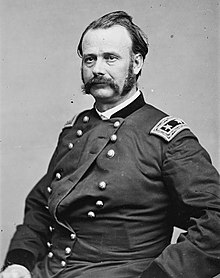
Major General Lovell Rousseau, now Junior Senator from Kentucky
The only open Democrat returned was New Jersey's John P. Stockton although it was not clear whether the impact of the "Kearny" effect would allow the state to remain controlled by the Democrats much longer...
Two noted radical Republicans were returned to add their voices to the sea of anti-Southern invective - Henry Wilson of Massachusetts and the extremely controversial James H. Lane of Kansas. George H. Williams was appointed to Oregon's Senate seat and for some time he would vote with the radicals before his pro-military views would see his conversion into a moderate National Unionist...
The Administration was not without allies in this class however. Several conservative Republicans were returned: James W. Grimes of Iowa, Jacob M. Howard of Michigan, Henry B. Anthony of Rhode Island, Waitman T. Willey of West Virginia and Richard Yates of Illinois...
Other senators appointed were Daniel Sheldon Norton of Minnesota, William Pitt Fessenden of Maine who sought to balance the conservative and radical wings of the Republican party, and Thomas M. Edwards of New Hampshire."
The House of Representatives
"The voting for the House would begin in Oregon on June 5 1864 and would continue until Kentucky voted on August 7 1865. The election saw a radical alteration in the makeup of the House...
Republicans would increase their seats from 88 to 130, although that did not include 11 congressmen who were elected as National Unionists, 8 of whom caucused with the Republicans. The Constitutional Unionists were reduced from 24 seats to 15 as the number of voters "who weren't sure about anything" (according to Dan Sickles) declined. Hardest hit were the Democrats who were reduced from 72 seats to 35...
The election in Illinois would see Michael Crawford Kerr abandon the Democrats completely in his disgust with Copperheads. He stood and won as an anti-Copperhead National Union candidate but in Congress would refuse to caucus with the Republican Party but instead voted his conscience...
Influential Southern Illinois politician "Black Jack" Logan was not yet prepared to surrender his military commission. However he did not ignore his state's election, ensuring the election of close friend and ally Major Andrew J. Kuykendall to Congress...
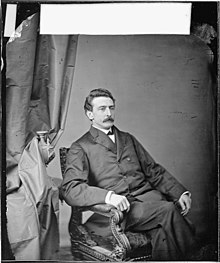
Colonel Phelps of Maryland
In Maryland Colonel Charles E. Phelps of the 7th Maryland had intended to run on the Democratic ticket. He was however prevailed upon by friends to declare himself an independent National Unionist. Phelps, holder of the Kearny Cross, won with a resounding majority...
During the course of the election in Maryland, Benjamin Gwinn Harris, Democratic Candidate for Congress was arrested and questioned in relation to the Baltimore Spy Ring. The resulting scandal ended any chance he had of election. Eventually all charges were dropped, conveniently long after the election...
Massachusetts would return one congressman of dubious note and reputation. While General Kearny had been clear that any man wishing to stand for office should be granted leave to do so, within reason, one officer's request was met with a full honorable discharge. General Nathaniel P. Banks was told his services were no longer required by the army and he was free to run for office without let or hindrance. Surprisingly, the very unsuccessful soldier secured a seat in the House...
The results of Michigan's elections, particularly to the House of Representatives, would have far reaching implications when the were drawn to the attention of General Kearny. In a state where, of the 110,000 men available to fight, 90,000 had volunteered, not a single representative from the state at any level had served in the army...
Minnesota's eccentric Ignatius L. Donnelly would play an important if controversial role in the new Freedmen's Bureau...
In contrast to the absence of veterans in Michigan's delegation, all but one of Missouri's representatives had served in uniform whether in the militia, volunteer or regular army (National Unionist Henry Taylor Blow was the exception)...
New York returned one of the most liberal Republicans in Congress, Henry Jarvis Raymond. He was to oppose the administration's policies on citizenship and exile throughout the coming Congress...
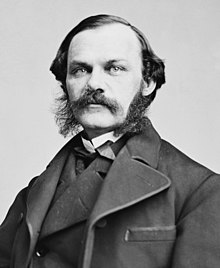
Enemy of "wild theories of citizenship and statehood" liberal Republican Henry Jarvis Raymond
Ohio had, in pure military terms, the most impressive list of Congressmen. Three Brigadier Generals and a Major General topped a list littered with Colonels and Majors - Brigadiers Rutherford B. Hayes, Ralph P. Buckland, James A. Garfield and the acknowledged head of the McCook clan, Major General Anson George McCook.
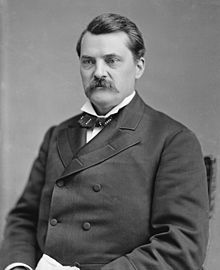
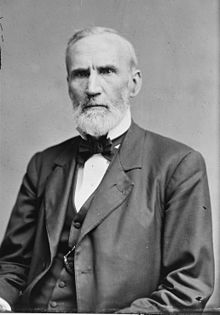
Major General Anson George McCook of Ohio and George Washington Julian of Indiana
General McCook would remain an ever-growing power in Ohio politics for years to come...
Indiana would return the greatest Radical of them all. Calling for the Rebels to be "swept away like the Jews of old" (Indiana Daily Sentinel), George Washington Julian would stand in the coming Congress as the extreme voice of the Radical wing of the Republican Party. Had it been within his power he would have "visited the plagues of Egypt upon the South"..."
Last edited:
One big chapter as I am moving over the next few days and may not have internet access for a couple of weeks after that while I wait for a connection. This chunky chapter will have to keep you going until then...
Looks like the government is getting completely dominated by Republicans. It seems like the National Unionists might stay around after the war, as people seem to be joining them and not necessarily caucusing with the Republicans.
Lots of officers running and winning everywhere, though that's probably essentially the same as OTL.
Lots of officers running and winning everywhere, though that's probably essentially the same as OTL.
Looks like the government is getting completely dominated by Republicans. It seems like the National Unionists might stay around after the war, as people seem to be joining them and not necessarily caucusing with the Republicans.
Lots of officers running and winning everywhere, though that's probably essentially the same as OTL.
I see some big changes. However it is interesting that many are defined by or referred to by their rank. Is that significant?
I see some big changes. However it is interesting that many are defined by or referred to by their rank. Is that significant?
More glorification of the military, perhaps? This seems to indicate we'll see a stronger, more influential military in postwar politics. If the military is more prestigious/influential, more people will want to associate themselves with it by calling themselves by their rank.
Threadmarks
View all 207 threadmarks
Reader mode
Reader mode
Recent threadmarks
Chapter One Hundred and Fifty Nine The Long Road Home Chapter One Hundred and Sixty A New Beginning Part I Chapter One Hundred and Sixty One A New Beginning Part II Chapter One Hundred and Sixty Two A New Beginning Part III Chapter One Hundred and Sixty Three The Emperor is Enthroned Chapter One Hundred and Sixty Four The Emperor's Coat-tails Part One Chapter One Hundred and Sixty Five The Emperor's Coat-tails Part Two Chapter One Hundred and Sixty Six The Consuls of His Empire
Share: